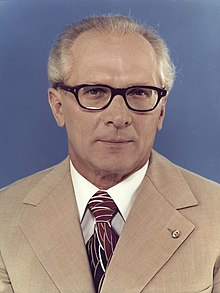

General Secretary of the Socialist Unity Party of Germany
25 August 1912 Neunkirchen, Rhine Province, Prussia, German Empire
29 May 1994(1994-05-29) (81) Santiago, Chile
3 May 1971 – 18 October 1989
"Honecker" redirects here. For others so named, see Honecker (surname). Not to be confused with Eric Honegger. 20th-century German communist politician Erich Ernst Paul Honecker (German: ; 25 August 1912 – 29 May 1994) was an East German communist politician who led the German Democratic Republic (East Germany) from 1971 until shortly before the fall of the Berlin Wall in October 1989. He held the posts of General Secretary of the Socialist Unity Party of Germany (SED) and Chairman of the National Defence Council; in 1976, he replaced Willi Stoph as Chairman of the State Council, the official head of state. As leader of East Germany, Honecker had close ties to the Soviet Union, which maintained a large army in the country. Honecker's political career began in the 1930s when he became an official of the Communist Party of Germany, a position for which he was imprisoned by the Nazis. Following World War II, he was freed by the Soviet army and relaunched his political activities, founding the SED's youth organisation, the Free German Youth, in 1946 and serving as the group's chairman until 1955. As the Security Secretary of the SED Central Committee, he was the prime organiser of the building of the Berlin Wall in 1961 and, in this function, bore responsibility for the "order to fire" along the Wall and the larger inner German border. In 1970, Honecker initiated a political power struggle that led, with support of Soviet leader Leonid Brezhnev, to his replacing Walter Ulbricht as General Secretary of the SED and chairman of the National Defence Council. Under his command, the country adopted a programme of "consumer socialism" and moved towards the international community by normalizing relations with West Germany and also becoming a full member of the UN, in what is considered one of his greatest political successes. As Cold War tensions eased in the late 1980s with the advent of perestroika and glasnost—the liberal reforms introduced by Soviet leader Mikhail Gorbachev—Honecker refused all but cosmetic changes to the East German political system. He cited the continual hardliner attitudes of Kim Il-sung and Fidel Castro, whose respective regimes of North Korea and Cuba had been critical of reforms. As anti-government protests grew, Honecker begged Gorbachev to intervene with the Soviet army to suppress the protests to maintain communist rule in East Germany as Moscow had done with Czechoslovakia in the Prague Spring of 1968 and with the Hungarian Revolution of 1956, but Gorbachev refused. Honecker was forced to resign by the SED Politburo in October 1989 in a bid to improve the government's image in the eyes of the public; the effort was unsuccessful, and the regime would collapse entirely the following month. Following German reunification in 1990, Honecker sought asylum in the Chilean embassy in Moscow, but was extradited back to Germany in 1992, after the fall of the Soviet Union, to stand trial for his role in the human rights abuses committed by the East German government. However, the proceedings were abandoned, as Honecker was suffering from terminal liver cancer. He was freed from custody to join his family in exile in Chile, where he died in May 1994.

We use cookies
We use cookies and other tracking technologies to improve your browsing experience on our website, to show you personalized content and targeted ads, to analyze our website traffic, and to understand where our visitors are coming from. Privacy Policy.